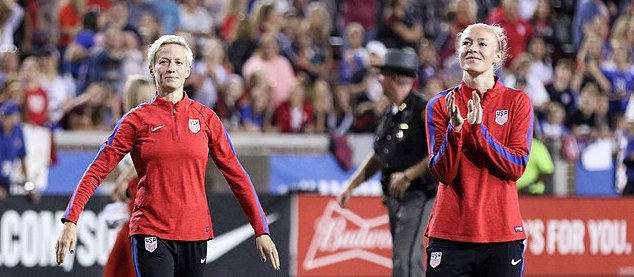The struggle for women’s pay equality in sports has triumphed on one of its biggest public stages. On May 18, the U.S. Soccer Federation announced that it ratified a collective bargaining agreement, which pays the U.S. men’s and women’s national teams equally. This follows the Feb. 22 settlement in which the USSF and U.S. Women’s National Team agreed to $22 million in back pay and guaranteed equal salaries going forward.
The lawsuit was first announced on March 8, International Women’s Day, 2019. The USWNT at the time was paid just 38% of what the U.S. men’s national team were paid, and the lawsuit detailed a deficit between the teams in their “playing conditions, training conditions, quality of coaching and medical care, and the quality of transportation used for travel to away games,” as Liberation News reported at the time.
Upon ratification of the CBA, the union representing the players — the USWNT Players Association — congratulated the star athletes on their monumental victory. USWNT President Becky Sauerbrunn released a statement saying, “‘Thank you,’ to the women who led and continue to lead the fight for equal pay across sports and in everyday life. This work stretches long into the past and will continue well into the future.”
Gains won through struggle
In addition to equal salaries and the potential to earn more money, the USWNT won equal pay per game played, equal pay per day in camp, equal pay per outcome of similar competitions, equal paid rate for ticket share, equal split of International Federation of of Association Football prize money, equal accommodations, equal ticket revenue distribution and up to six months in parental leave.
The settlement between the USSF and USWNT amounted to just a third of the $66.7 million the team initially demanded in back pay. However, the new CBA all but guarantees players will make several times more than their previous minimum salary of $16,538 (Liberation News).
This historic victory for the USWNT was not achieved without struggle or compromise. It took decades of USWNT players speaking out and organizing on and off the field to win these gains.
There are recent examples of Alex Morgan, Megan Rapinoe and others speaking out against poor lodging conditions, inadequate training facilities, as well as kneeling in solidarity with Colin Kaepernick against systemic racism. It’s also important to recognize contributions made in the more distant past that no doubt paved the way for this victory.

For example, following their 1999 World Cup win against the People’s Republic of China, all 20 members of the USWNT boycotted the 2000 Australia Cup after they were each offered a measly $6,300 without per-game bonuses. It was then that the USWNT struggle for equal pay became a household discussion.
One standout action, which is now memorialized in the Paley Center’s Title IX exhibit, happened in 2019 when the USWNT took the field wearing their warm up jerseys inside out to hide the USSF crest. They protested in response to then USSF President Carlos Cordeiro arguing in court that the USMNT and USWNT don’t do equal work, because women don’t have the same physical strength or skills as men. Cordeiro’s sexist stance, and the organized resistance in response, led to his resignation and replacement in March 2020.
When Federal Judge R. Gary Klausner dismissed the USWNT’s equal pay claims in May 2020, Megan Rapinoe and other team leaders continued fighting. The $22 million settlement came just two weeks before the players were set to re-appeal Klausner’s dismissal — their initial appeal was denied.
A victory that exposes U.S. gender inequality
The unequal treatment of the USWNT throughout its history is a microcosm of gender inequality in the U.S. and resistance to it. Women and others in the U.S. are fighting to maintain basic bodily autonomy as abortion rights are under attack at the same that the LGBTQ community is also under assault by bigots. While considered by many to be a privilege in the United States, maternity leave and free abortion on demand are enshrined in Cuba’s constitution — just 90 miles from Florida‘s coast.
Working-class women in Cuba and the United States alike have a history of leading mass struggles against oppression. But unlike the U.S. Constitution and Bill of Rights, “The Cuban Constitution explicitly grants women equal economic, political, cultural, social and familial rights with men and prohibits discrimination based on race, skin color, sex, national origin, religious belief or any other form of discrimination,” (Liberation School).
State institutions such as the Federation of Cuban Women and CENESEX advance the “revolution within the revolution” regarding the role of women and LGBTQ people in Cuba’s socialist society. No such institutions currently exist in the United States.
We must stand with and support the gains made by the USWNT and women fighting in their workplaces and neighborhoods across the United States and keep pushing to build a future free of gender oppression and exploitation. We can do so by learning from our own country’s feminist struggles as well as those of our neighbors and others throughout history.





